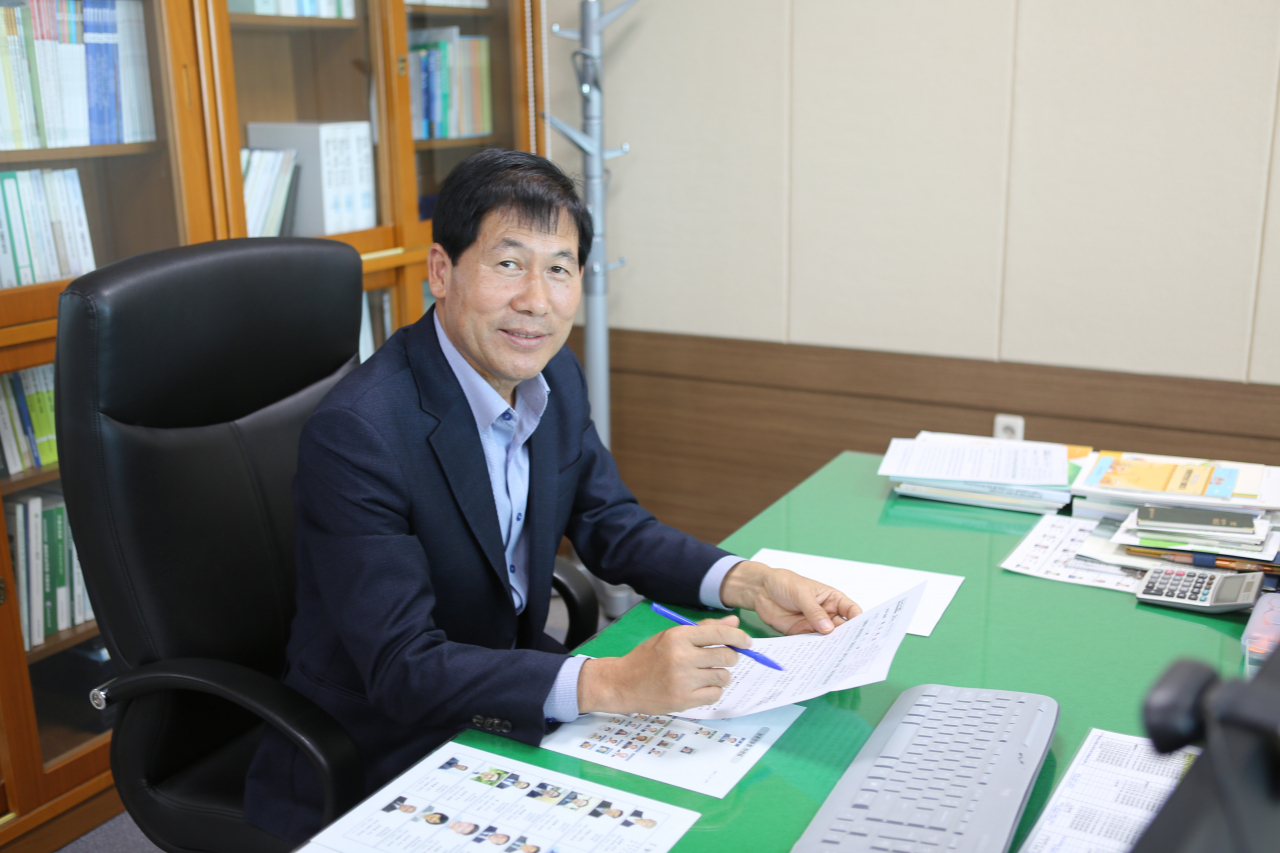[Herald Interview] Jeju striving to develop own unique citrus
Jeju-grown golden kiwis also aim high to reduce dependence on New Zealand's Zespri
By Byun Hye-jinPublished : Nov. 14, 2022 - 15:49

JEJU -- Fun fact: Tangerines produced in South Korea’s resort island of Jeju, well-known for these sweet and sour fruits, actually originated from Japan. As time passed, most of the tangerines have been modified for cultivation within Korea, but their histories can still be traced back to Japan.
In a move to promote authentic Korean food and reduce dependency on foreign fruits, Jeju is striving to produce its homegrown tangerines, according to an executive from a state-run agricultural agency.
“Jeju tangerines including Sumo Citrus also known as Hallabong, Kanpei, Setoka, and Beni-Madonna -- crossbred fruits -- all came from Japan. Only 3 percent of tangerines use breeding methods originally developed from Jeju,” said Heo Jong-min, head of Jeju Agriculture Technology Institute, during a recent interview with The Korea Herald.
“We are planning to develop four types of tangerines -- Gaeulhyang, Dalkomi, Woorihyang and Seolhyang by 2023. They are crossbreeds of Kanpei and Beni-Madonna or Kanpei and Satomi orange, with modifications made to the sweet and sour levels."
Heo said the homegrown Jeju tangerines will be harvested before December, to cater to the demands that spike during Chuseok holiday in Autumn. The existing Japanese-originated tangerines are mostly harvested in January and February.
The institute is also growing new types of golden kiwis with an aim to be less dependent on Zespri, the world’s largest kiwifruit provider based in New Zealand. Over half of Kiwi farmers in Jeju grow Zespri kiwis.
Heo added Jeju kiwis will contribute to diversifying the fruit crops grown here as well. Currently, tangerines accounts for around 40 percent of total fruit production.
Under the vision of Carbon-Free Island 2030, Jeju is making efforts to come up with farming methods to reduce carbon emissions using natural energy.
“The island generates a considerable amount of carbon dioxide because it grows many tangerines and subtropical fruits including mango and dragon fruit in greenhouses,” said Heo. “For the last two years, we have successfully carried out a pilot project that provided farmers with heater pumps using rainfall.”
When rain falls, the heater pump stores the water and use electric energy to heat them. The heat energy then provides best temperature for fruits.
In 2020 and 2021, 68 farmers participated in the project and reduced 9,305 tons of carbon dioxide. For the next 10 years, they can generate 2.7 billion won in profit by selling their carbon emissions permit in the market.
The institute has also provided eco-friendly microbial farming method using microscopic organisms extracted from lands, plants and other environmental elements as alternatives to chemical fertilizers.
Innovative farming appliances and machinery are on their way to help farmers as well. In order to prevent the excessive use of fertilizers, Heo said the institute has made a digital watch that shows the remaining amount of fertilizers.
“Jeju has many rocks within the island’s soil, making it a hostile environment to use automotive farming machinery. But we hope small efforts such as digital watch could bring great changes to the island.”
Through the annual Electric and Autonomous Agriculture Expo, we plan to open discussions on the development of next generation agriculture machinery between public and private sectors, Heo added.
Officially titled “IEVE Expo: The 1st Electric and Autonomous Agriculture,” the expo was co-hosted by the International Electric Vehicle Expo, the Korea Global EV Association Network, Jeju Special Self-Governing Province and the Korea Agricultural Machinery Forum. It was held at the Jeju Agriculture Technology Institute in Seogwipo on Nov. 8-11. The Korea Herald was a media partner for the event.




















![[Today’s K-pop] BTS pop-up event to come to Seoul](http://res.heraldm.com/phpwas/restmb_idxmake.php?idx=642&simg=/content/image/2024/04/17/20240417050734_0.jpg&u=)